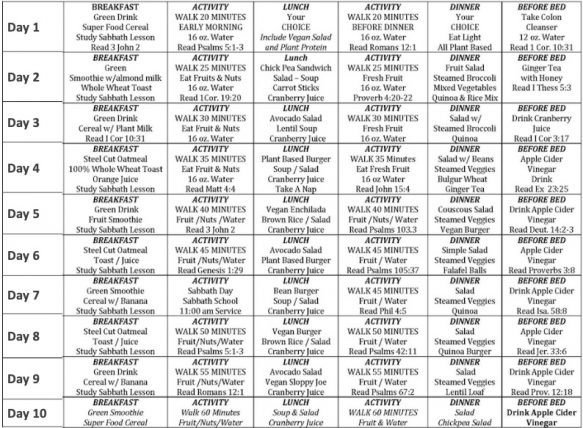DANIEL “10 DAY PLUS” TOTAL HEALTH COMMITMENT PLAN

Please consult with your doctor before attempting any change in your diet, for ALL humans are different, and ALL health conditions require expert attention and treatment.
The diet that Daniel chose in Daniel 1:12 was a restrictive diet. (Read all of Daniel 1) “Prove thy servants, I beseech thee, ten days; and let them give us pulse to eat, and water to drink.” The scriptures make it clear that Daniel chose not to eat the King’s meat or his wine, but instead ate the only things available from the king’s table, and that was food that he ate from a child in his country. This diet proved to be the best diet, and when Daniel and his Hebrew friends were examined, they had the two outstanding visible advantages: they had the best-looking bodies; and they had the sharpest and brightest minds among all young men assembled.
This DANIEL “10 DAY PLUS” TOTAL HEALTH COMMITMENT PLAN is an attempt to get all who would commit to it the opportunity to bring the physical body and the spiritual mind into harmony to God’s will so that like Daniel, the higher mind will rule over the lower mind (stomach).
The DANIEL “10 DAY PLUS” TOTAL HEALTH COMMITMENT PLAN will require a commit-ment on your part to begin a new direction in improving your health: During these ten days, YOU will be ASKED to sacrifice from using all animal products and sweets like cake, cookies, and candy.
What are the benefits that you will experience: 10 days without cholesterol; 10 days without flesh; 10 days without white sugar; 10 days without Trans fats; but 10 days of building new blood - that will produce good body cells, that will build good tissue – that will produce good functioning organs – that will produce improved body systems – that will result in a keen, sharp, elevated spiritual mind that has demonstrated the victory of placing Biblical principles over temptations to indulge in appetite.
“Here is a lesson for all, but especially for the young. A strict compliance with the requirements of God is beneficial to the health of body and mind. In order to reach the highest standard of moral and intellectual attainments, it is necessary to seek wisdom and strength from God, and to observe strict temperance in all the habits of life. In the experience of Daniel and his companions we have an instance of the triumph of principle over temptation to indulge the appetite. It shows us that through religious principle young men may triumph over the lusts of the flesh, and remain true to God's requirements, even though it cost them a great sacrifice.” [DANIEL'S DIET--117, 241, 242] {CD 32.1}
Protein Quality
Until recently, even many scientists were accustomed to classify meats ”first-class” proteins and vegetables as "second-class" proteins, thereby implying that nonanimal sources of protein were somehow inferior in quality. The most current medical and scientific evidence, however, points to other considerations:
- Humans can subsist perfectly well on a proper nonflesh diet;
- Statistically, vegetarians in the United States are thinner, healthier, and may live longer than flesh eaters;
- Protein from nonflesh foods can be an adequate nutritional substitute for flesh or meat protein.
Protein is essential to life: It is the substance that the body uses to build and replenish its organs, skin, cartilage, nails, hair, muscles, and the organic framework of bones. The proteins that our bodies use are composed of 22 amino acids, not all of which must come from the diet. The human metabolic system can synthesize (produce by uniting chemical elements) 14 of these 22 amino acids, but the remaining 8 must be obtained from food sources outside the body. Hence their name--the essential amino acids.
Below, you will find the types of protein used by those who lived in the regions of the world that is now known as the Middle East: Bulgur (also bulghur or burghul) whole-grain, high-fiber bulgur and cracked wheat can be found in natural food stores. Bulgur is a common ingredient in Turkish, Middle Eastern, Indian and Mediterranean dishes. It has light, nutty flavor. Bulgur can be used in pilafs, soups, bakery goods, or as stuffing. It is also a main ingredient in tabbouleh salad and kibbeh. Its high nutritional value makes it a good substitute for rice or couscous. In Indian cuisine, bulgur or daliya is also used as a cereal with milk and sugar.
Couscous or kuskus as it is known in Morocco, Algeria, Tunisia, Libya and Egypt (pronounced /ˈkuːskuːs/ is also popular in the West African Sahel, in France, Madeira island, in western Sicily's Trapani province, and parts of the Middle East. It is particularly popular among Jews of North African descent, such as the Berber Jews,[4] and is eaten in many other parts of the world as well. Quinoa (pronounced /ˈkinwɑ/ KEEN-wah or /ˈkinoʊə/ KEE-no-uh, Spanish quinua, Quinoa originated in the Andean region of South America, where it has been an important food for 6,000 years… this crop has become highly appreciated for its nutritional value, as its protein content is very high (12%–18%), making it a healthful choice for vegetarians and vegans. Unlike wheat or rice (which are low in lysine), quinoa contains a balanced set of essential amino acids for humans, making it an unusually complete protein source.[5] It is a good source of dietary fiber and phosphorus and is high in magnesium and iron. Quinoa is gluten-free and considered easy to digest. Because of all these characteristics, quinoa is being considered a possible crop in NASA's Controlled Ecological Life Support System for long-duration manned spaceflights.[5]
The organic grains above can be purchased in bulk at Whole Foods Market on 3rd and Fairfax, or Erewhon on Beverly and The Grove Drive, and at other natural health food stores. Recipes for use will be available on the Berean website. These health food stores also sells a large green salad mix that keeps fresh for several days. Get fresh fruits from local Farmers. Buy Cereal that has the Whole Grain stamp on the box top. If you have to, use natural sugar for added sweetness in smoothies and cereal. Please make sure that your meatless protein burger or tofu does not contain the words natural flavor, autolyzed yeast, yeast extract, soy protein isolate, or textured protein – these are all hidden forms of MSG!!!
